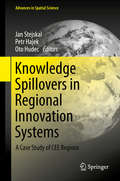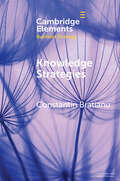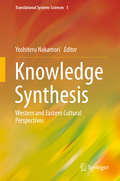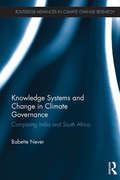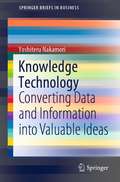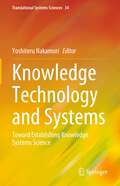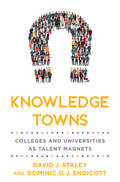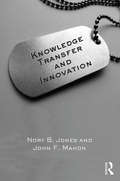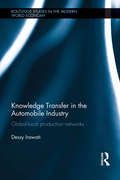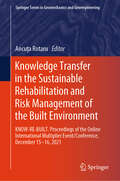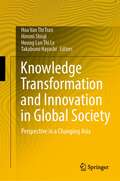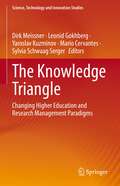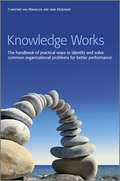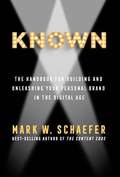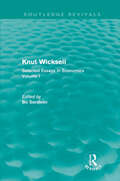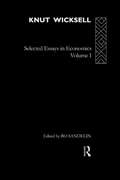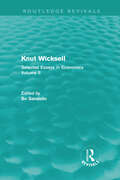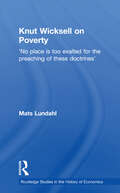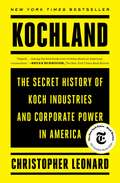- Table View
- List View
Knowledge Spillovers in Regional Innovation Systems: A Case Study Of Cee Regions (Advances in Spatial Science)
by Jan Stejskal Petr Hajek Oto HudecThis book provides an assessment of the evolution and dynamics of regional innovation systems (RISs) and the economic and social impact of resulting knowledge spillovers, presenting comparative case studies on the regions of several Central and Eastern European (CEE) countries (Czech Republic, Poland, Hungary, Slovakia, Lithuania and Estonia).It analyses RISs on the basis of several dimensions, such as absorption capacity and intellectual capital, and using several methods such as data envelopment analysis, patent network analysis, and weighted sum approach.Further, by looking at the economic and social impact of knowledge spillovers in RISs and networking, it identifies key distinguishing factors, including foreign direct investments, still prevalent centralized decision-making, EU-driven innovation policies and public financing of innovations. Sectoral case studies, e.g. from the automobile, chemical and other hi-tech manufacturing industries, are presented to help readers understand the different types of knowledge spillovers in CEE countries and the evolution and dynamics of RISs, and provide a multifaceted overview of the CEE regions.
Knowledge Strategies (Elements in Business Strategy)
by Constantin BratianuKnowledge is a strategic resource of any organization and its deployment is critical in achieving a sustainable competitive advantage. Knowledge strategies were born at the intersection of strategic thinking and knowledge management. Strategic thinking is a mental process of understanding the future and, based on that understanding, of searching for practical ways of achieving a competitive advantage on the market. Strategic thinking is operating in the opportunity space of the organization. The book explains the strategizing process and presents the knowledge strategies as a result of that complex mental process. Organizations can design deliberate and emergent knowledge strategies, which can be integrated into the corporate vision and its strategies.
Knowledge Synthesis
by Yoshiteru NakamoriThis book provides readers the idea of systemically synthesizing various kind of knowledge, which needs to combine analytical thinking and synthetic thinking. Systems science is expected to help in solving contemporary complex problems, utilizing interdisciplinary knowledge effectively and combining analytical thinking and synthetic thinking efficiently. However, traditional systems science has been divided into two schools: one seeks a systematic procedure to give a correct objective answer; the other develops an emergent, systemic process so that the user can continue exploratory learning. It is not an exaggeration to say that analytical thinking and synthetic thinking have been developed independently, in different schools. This book integrates approaches developed in these two schools, using ideas in knowledge science that have been emerging recently under the influence of Eastern thinking. It emphasizes the importance of utilizing intuition in systems approaches, whereas other books usually try to solve problems rationally and objectively, rejecting subjectivity. This book never denies rationality and objectivity; however, complex problems of today do not always yield to complete analysis. The novelty of this present volume is that it takes in the ideas of synthetic thinking in knowledge science to develop systems science further. The chapter contributors, who are experienced systems scientists with a profound understanding of knowledge management, discuss knowledge synthesis from the Western and Eastern cultural perspectives. The book introduces a theory on systemic knowledge synthesis in an odd chapter and then presents an application of the theory in the next chapter in order to contribute to developing translational systems science.
Knowledge Systems and Change in Climate Governance: Comparing India and South Africa (Routledge Advances in Climate Change Research)
by Babette NeverThe success of international efforts to manage climate change depends on the participation of emerging economies. This book uses a comparative study of two of the most important, India and South Africa, to reveal new insights into managing climate change on a global scale. The book provides a unique in-depth analysis of how these two countries are dealing with climate change at both national and province levels, from India’s advances in solar and wind energy development to South Africa’s efforts to introduce a carbon tax. Using the innovative theoretical framework of climate knowledge systems, it explores how people in India and South Africa engage with one other, learn and act by forming communities of practice. The book identifies the drivers and barriers of climate governance, showing how different forms of scientific, technological, normative and pragmatic knowledge can aid climate governance and analysing how the underlying mind-set that guides climate action in these countries is changing. This book is a valuable resource for students and scholars of environmental policy, politics and governance, as well as comparative politics, climate change and sustainable development.
Knowledge Technology: Converting Data and Information into Valuable Ideas (SpringerBriefs in Business)
by Yoshiteru NakamoriThis book reviews creative technologies that underpin the human activities of converting data and information into knowledge, creating new ideas based on that knowledge, and validating those ideas. The book calls such creative technology “knowledge technology” and explores its challenges in the age of big data. Today, artificial intelligence and big data are successfully performing pattern recognition and decision making on behalf of humans, who are incapable of processing large amounts of information instantly and accurately. In using only past data, however, there are limits to future predictions with artificial intelligence and big data. Humans need to take the lead in predicting or creating the future by trying to understand why data emerged. Knowledge technology contributes to that understanding, regardless of the field of origin. As a matter of fact, knowledge technology includes many technologies developed in informatics, management study, and systems science. The desirable features of knowledge technology are the complementary use of rational and intuitive approaches, the integration of results from quantitative and qualitative analyses, and the cooperation between artificial intelligence and humans.
Knowledge Technology and Systems: Toward Establishing Knowledge Systems Science (Translational Systems Sciences #34)
by Yoshiteru NakamoriThis book discusses technology and systems to create valuable ideas from data through the construction of knowledge. The primary concern is to make better decisions about economic and management issues in today’s information-flooded society. Human creative activity is in the realm of soft technology, with no physical entity to operate. Focusing on the ability of knowledge as judgment power, this definition results: “Knowledge technology is soft technology that underpins the human creative activities of converting data and information into knowledge, creating new ideas based on that knowledge and validating those ideas.” That definition includes a wide range of soft technologies developed in informatics, management studies, and systems science. The knowledge system creates ideas from data and knowledge through knowledge technologies. Based on the proposition that knowledge emerges by the interaction between explicit and tacit knowledge, another definition is possible: “The knowledge system is a system that promotes interaction between codified and personalized knowledge and creates ideas for solving a specific problem.” Codified knowledge includes data and information, while personalized knowledge is empirical knowledge or wisdom that is difficult to put into words. Building a knowledge system requires mathematical or intelligent knowledge technology and participatory knowledge technology to create or manage codified knowledge and personalized knowledge. For example, a company builds cross-sectional knowledge systems by gathering human resources from various departments, according to the purpose, as in new product development or sales promotion. Chapter 1 defines knowledge technology and the knowledge system and organizes the challenges in their development, while Chapters 2 through 9 introduce mathematical or intelligent knowledge technologies by researchers at the forefront of knowledge technology development.
Knowledge Towns: Colleges and Universities as Talent Magnets (Higher Education and the City)
by David J. Staley Dominic D. EndicottThe remote work revolution presents a unique opportunity for higher education institutions to reinvent themselves and become talent magnets.In Knowledge Towns, David J. Staley and Dominic D. J. Endicott argue that the location of a college or university is a necessary piece of any region's effort to attract remote knowledge workers and accelerate economic development and creative placemaking. Just as every town expects a church, bank branch, post office, and coffeehouse, Staley and Endicott write, we will see a decentralized network of institutions of higher education flourish, acting as cornerstones for the post-pandemic rebuilding of our society and economy. In calling for a "college in any town," they are not simply proposing placing a traditional college within a town or city, but envisioning instead a particular kind of higher education institution called a "knowledge enterprise." In addition to providing the services of a traditional college, a knowledge enterprise acts as a talent magnet, attracting workers looking to move to cheaper and more attractive destinations.With the post-COVID-19 shift to more remote work, and millions of people moving to more affordable and livable cities, a place that wants to attract talent will require a thriving academic environment. This represents a new opportunity for "town and gown" to create collaborative communities. The pandemic has accelerated existing trends that put at risk the viability of many colleges and universities, as well as that of many towns and cities. The talent magnet strategy outlined in this book offers colleges and towns a plan of action for regeneration.
Knowledge Transfer and Innovation
by Nory B. Jones John F. MahonThis book demonstrates how managers can use and transfer knowledge more effectively to stimulate innovation in their organization in order to increase their competitive advantage. Jones and Mahon draw on their discussions with combat Veterans, whose very survival relies on their skill in transferring crucial knowledge and information quickly, effectively and efficiently. They note that in today’s competitive and fast-paced business world, these skills translate into continual innovation, metamorphosis,and ultimately success. The authors have built a conceptual framework that demonstrates to the reader how to develop the same underlying skills and to use them effectively in the business environment. With rich and lively examples throughout, Knowledge Transfer and Innovation equips students and practitioners of knowledge management, innovation, leadership and strategy with the skills, tools and strategies to succeed in today’s fast-paced business environment.
Knowledge Transfer in Higher Education
by Lisa Mooney SmithA presentation of four years of close observation of research and knowledge transfer practices in a university. It attempts to contextualise knowledge transfer within the arts and humanities, as well as situate learning about the reception and adoption of it by the individual scholar and the organisation in which they operate.
Knowledge Transfer in the Automobile Industry: Global-Local Production Networks (Routledge Studies in the Modern World Economy)
by Dessy IrawatiThe book arose from a multi-disciplinary study which looked at the development of global-local manufacturing clusters in the context of a developing, Asian economy. The study demonstrates the connection amongst theoretical perspectives such as international business, development studies, economic geography, and organisational learning clusters/production networks through an in-depth case study of the Indonesian automotive cluster. The book gives a detailed account of two automotive clusters (Toyota and Honda) and their contribution to regional economic development in emerging economies in Asian region. The book builds on existing literature to develop a theoretical framework to shed light on the study's empirical findings. The book discusses practical implications for both the business community and policy makers. The discussion on global-local networks in an Asian context supplements existing literature and case studies in the field. This is one of the few books that explicitly links regional clusters to global networks. The book offers a refreshingly international (Asian) perspective to the literature on clusters and economic geography for emerging economies.
Knowledge Transfer in the Sustainable Rehabilitation and Risk Management of the Built Environment: KNOW-RE-BUILT. Proceedings of the Online International Multiplier Event/Conference, December 15-16, 2021 (Springer Series in Geomechanics and Geoengineering)
by Ancuța RotaruThis book showcases the valuable contributions made during the online event entitled The International Conference on Knowledge Transfer in the Sustainable Rehabilitation and Risk Management of the Built Environment. The conference was held on December 15–16, 2021, and was organized as a multiplier event of the European project Rehabilitation of the Built Environment in the Context of Smart City and Sustainable Development Concepts for Knowledge Transfer and Lifelong Learning (RE-BUILT). This book specifically retains the same main themes explored in the book titled Critical Thinking in the Sustainable Rehabilitation and Risk Management of the Built Environment – CRIT-RE-BUILT. The papers included in this book are mostly authored by partners in the project’s consortium and cover various aspects of civil engineering knowledge transfer in crucial areas, to address different perspectives and significant challenges related to the sustainable built environment. The book seeks to provoke ideas and discussions, particularly in the areas where risk management and sustainable rehabilitation of the built environment intersect, ranging from reducing hazard risks to enhancing sustainable rehabilitation efforts in the field
Knowledge Transformation and Innovation in Global Society: Perspective in a Changing Asia
by Hoa Van Thi Tran Hiromi Shioji Huong Lan Thi Le Takabumi HayashiThis is the first book to fully explain the changing management and business models in the current era of important new developments in knowledge and information occurring all over the world. The research and its outcomes presented here focus especially on diverse cases from emerging countries in East Asia, where local companies face similar technological change.The pandemic has seriously changed people's lives and affected the development of society as a whole, while digital technologies have become even more greatly in demand. Those are very difficult to fit into traditional management models created decades ago, however. For the successful implementation of such a transition, new paradigms, models, and technologies for the transformation of control systems are needed. To meet that need, a new paradigm to bring about innovation under the new knowledge transformation system is required.This book presents the experiences of beginning such a knowledge transformation inEast Asian countries. Despite the fact that the countries are in the same geographical region, their experiences are quite diverse, determined by cultural, historical, religious, and psychological factors. These differences appear not only in such important areas as R&D processes, but also in production, finance, HR management, and marketing. Readers will find innovative solutions for the transformation of management in the new knowledge transformation system that is the focus of this book.
The Knowledge Triangle: Changing Higher Education and Research Management Paradigms (Science, Technology and Innovation Studies)
by Dirk Meissner Leonid Gokhberg Yaroslav Kuzminov Mario Cervantes Sylvia Schwaag SergerThis book helps readers understand how universities position themselves in the innovation landscape and the implications for national policies. It provides a scholarly discussion and best practice–based insights to help answer questions like: To what extent do funding and governance policies support activities within the knowledge triangle? How should policies for universities be designed in countries with different industrial and higher education structures? Are there ways to effectively link universities with regional enterprises and social actors? And finally, what are the new institutional models and best practices for overcoming obstacles to interaction, collaboration, and co-creation?
Knowledge Work Processes
by Thomas H. DavenportA time-honored way of improving any form of work is to treat it as a process. This process-based approach to performance, however, has not been widely applied to the arena of knowledge work. If managed correctly, process orientation can make knowledge work more productive and empowering. This chapter describes the most effective process interventions for different types of knowledge work. This chapter is excerpted from "Thinking for a Living: How to Get Better Performance and Results from Knowledge Workers."
Knowledge Works
by Christine Van Winkelen Jane MckenzieKnowledge Works is a handbook full of ideas to help you draw on people's knowledge to keep ideas fresh, reduce waste, and build competence and capability. You can either dip into it according to your needs, or work through it in a more systematic way to create a plan to improve your organization's performance."Knowledge Works is a very practical book that provides proven solutions for important knowledge-related problems in organizations including: how to convince managers that knowledge is important, how to create a knowledge-sharing culture, and how to improve the quality of conversations. A must-read for all managers of knowledge-intensive organizations."Daan Andriessen, Professor of Intellectual Capital, Inholland University of Applied Sciences, The Netherlands "To be successful as a manager, you need to make better decisions, be more innovative and to do more with less. In this highly practical handbook, Christine Van Winkelen and Jane McKenzie offer new ideas to challenge your current thinking and achieve this. Their work is soundly based on 10 years collaborative research with the Knowledge Management Forum at the Henley Business School."David Gurteen, Founder and Director, Gurteen Knowledge Community"This book shows in a very inspiring and hands-on way how knowledge works. This is an utmost important understanding in the growing intellectual economy for increased operational knowledge effectiveness. The book has in an impressive way systematized many challenging K-works perspectives, from knowledge mapping and flows to social media and knowledge creating conversations. It is demonstrating a number of insightful real life stories and projects during 10 years of the Henley KM Forum, as well as providing valuable reading notes. Happy Knowledge Work ..."Leif Edvinsson, Honorary Chairman for the Henley KM Forum, The World´s First Professor of Intellectual Capital
Known: The Handbook for Building and Unleashing Your Personal Brand in the Digital Age
by Mark W. SchaeferIn today's world, there is a permanent advantage to becoming known in your field. Those who are known get the customers, the better jobs, and the invitations to exclusive opportunities. But can anybody become known? In this path-finding book, author Mark Schaefer provides a step-by-step plan followed by the most successful people in diverse careers like banking, education, real estate, construction, fashion, and more. With amazing case studies, dozens of exercises, and inspiring stories, KNOWN is the first book its kind, providing a path to personal business success in the digital age.
The Known, the Unknown, and the Unknowable in Financial Risk Management: Measurement and Theory Advancing Practice
by Francis X. Diebold Neil A. Doherty Richard J. HerringA clear understanding of what we know, don't know, and can't know should guide any reasonable approach to managing financial risk, yet the most widely used measure in finance today--Value at Risk, or VaR--reduces these risks to a single number, creating a false sense of security among risk managers, executives, and regulators. This book introduces a more realistic and holistic framework called KuU --the K nown, the u nknown, and the U nknowable--that enables one to conceptualize the different kinds of financial risks and design effective strategies for managing them. Bringing together contributions by leaders in finance and economics, this book pushes toward robustifying policies, portfolios, contracts, and organizations to a wide variety of KuU risks. Along the way, the strengths and limitations of "quantitative" risk management are revealed. In addition to the editors, the contributors are Ashok Bardhan, Dan Borge, Charles N. Bralver, Riccardo Colacito, Robert H. Edelstein, Robert F. Engle, Charles A. E. Goodhart, Clive W. J. Granger, Paul R. Kleindorfer, Donald L. Kohn, Howard Kunreuther, Andrew Kuritzkes, Robert H. Litzenberger, Benoit B. Mandelbrot, David M. Modest, Alex Muermann, Mark V. Pauly, Til Schuermann, Kenneth E. Scott, Nassim Nicholas Taleb, and Richard J. Zeckhauser. Introduces a new risk-management paradigm Features contributions by leaders in finance and economics Demonstrates how "killer risks" are often more economic than statistical, and crucially linked to incentives Shows how to invest and design policies amid financial uncertainty
Knut Wicksell: Selected Essays in Economics, Volume 1 (Routledge Revivals: Knut Wicksell)
by Bo SandelinKnut Wicksell made enormous contributions to capital theory, monetary theory and fiscal policy. However whilst his books are widely available in English, few of his more than 800 articles have ever been translated. This volume, first published in 1997, includes new translations of Wicksell's contributions to marginalism and capital theory; public economics and unemployment.
Knut Wicksell: Selected Essays in Economics, Volume One (Routledge Revivals: Knut Wicksell Ser.)
by Bo SandelinKnut Wicksell made enormous contributions to capital theory, monetary theory and fiscal policy. However whilst his books are widely available in English, few of his more than 800 articles have ever been translated. This volume includes new translations of Wicksell's contributions to marginalism and capital theory; public economics and unemployment.
Knut Wicksell: Selected Essays in Economics, Volume 2 (Routledge Revivals: Knut Wicksell)
by Bo SandelinThis book, along with its predecessor, makes most of Wicksell's most important contributions accessible to English speaking readers for the first time. The essays collected here, first published in 1999, focus on money and price theory and include Wicksell's book reviews of Leon Walrus, Ludwig von Mises and John Bates Clark.
Knut Wicksell on the Causes of Poverty and its Remedy (Routledge Studies in the History of Economics #Vol. 73)
by Mats LundahlKnut Wicksell is arguably the greatest Swedish social scientist of all time, and poverty was a theme that occupied him all his life. Indeed, it was probably Wicksell's interest in poverty that was the critical factor in drawing him away from his purely mathematical background towards a greater understanding of the social sciences as a whole. In this outstanding volume, Mats Lundahl, one of the world's leading development economists, examines Wicksell's thinking in the area of poverty, and shows the importance of his contributions to this field.
Koc Holding: Arcelik White Goods
by Robin Root John A. QuelchManagement is considering its options for future international expansion. Koc is the dominant supplier of white goods (kitchen appliances) in Turkey and has been increasing its export efforts. As lower import tariffs invite foreign competitors to enter Turkey, Koc must decide how to balance defense of its domestic market share against further foreign expansion.
Kochland: The Secret History Of Koch Industries And Corporate Power In America
by Christopher Leonard‘A landmark book....A massively reported deep dive into the unparalleled corporate industrial giant Koch Industries....This impressively researched and well-rendered book also serves as a biography of Charles Koch, with Leonard providing an evenhanded treatment of the tycoon. Leonard's work is on par with Steve Coll's Private Empire and even Ida Tarbell's enduring classic The History of the Standard Oil Company.’ Kirkus Reviews ‘Leonard’s superb investigations and even-handed, clear-eyed reportage stand out....American capitalism at its most successful and domineering is at the center of this sweeping history of a much-vilified company.’ Publishers Weekly ‘Leonard’s intricately developed and extensively researched history of the Koch empire is a colossal corporate biography that sheds important light on this closely guarded enterprise while simultaneously scrutinizing the nefarious underpinnings of American economic policies and practices.’ Booklist ‘This page-turning exposé reveals the full extent of the Koch brothers’ influence on American capitalism.’ Book Riot ‘If you want a crash course in the evolution of postmodern capitalism over the last five decades read Kochland....Leonard's study is exhaustive and engaging.’ New York Journal of Books The annual revenue of Koch Industries is bigger than that of Google, Goldman Sachs and Kraft Foods combined. But very few people have ever heard of Koch Industries because the billionaire Koch brothers want it that way. Now, in Kochland, Christopher Leonard has managed what no other journalist has done before: to tell the explosive inside story of how the largest private company in the world became that big. In doing so, Leonard also tells the epic tale of the evolution of corporate America over the last half-century, in all its glory and rapaciousness. Koch is everywhere. It controls the fertilisers at the foundation of our food system. It controls the synthetics that make our diapers and carpets. It controls the chemicals that make our bottles and pipes. It controls the building materials that make our homes and offices. And it controls much of the Wall Street trading in all of these commodities. It makes money at every end of almost every deal. For five decades, CEO Charles Koch has kept Koch Industries quietly operating behind a veil of secrecy, with a view toward very, very long-term profits. When Wall Street came calling twenty years ago, trying to take Koch public, Charles Koch said no. He’s a genius businessman: patient with profits, able to learn from his mistakes, determined that his employees develop an almost a worshipful dedication to free-market ruthlessness, and a master disrupter. We think of disruption as something that happens in Silicon Valley, but this book will upend your understanding of what disruption really is. Charles Koch’s business acumen has made him and his brother David (Koch Industries’ co-owner) together richer than Bill Gates. But there’s a dark side to their story. If you want to understand how we killed the unions in this country, how we widened the income divide, how we stalled progress on climate change and how corporate America bought the influence industry, all you have to do is read this book. Seven years in the making, Kochland reads like a true-life thriller, with larger-than-life characters driving the battles on every page. The book tells the ambitious tale of how one private company consolidated power over half a century – and how in doing so, transformed capitalism into something that feels so deeply alienating to many Americans today.
Kochland: The Secret History of Koch Industries and Corporate Power in America
by Christopher LeonardNEW YORK TIMES BESTSELLER * NEW YORK TIMES NOTABLE BOOK OF 2019 * WINNER OF THE J ANTHONY LUKAS WORK-IN-PROGRESS AWARD * FINANCIAL TIMES&’ BEST BOOKS OF 2019 * NPR FAVORITE BOOKS OF 2019 * FINALIST FOR THE FINACIAL TIMES/MCKINSEY BUSINESS BOOK OF 2019 * KIRKUS REVIEWS BEST BOOKS OF 2019 * SCHOOL LIBRARY JOURNAL BEST BOOKS OF 2019 &“Superb…Among the best books ever written about an American corporation.&” —Bryan Burrough, The New York Times Book Review Just as Steve Coll told the story of globalization through ExxonMobil and Andrew Ross Sorkin told the story of Wall Street excess through Too Big to Fail, Christopher Leonard&’s Kochland uses the extraordinary account of how one of the biggest private companies in the world grew to be that big to tell the story of modern corporate America.The annual revenue of Koch Industries is bigger than that of Goldman Sachs, Facebook, and US Steel combined. Koch is everywhere: from the fertilizers that make our food to the chemicals that make our pipes to the synthetics that make our carpets and diapers to the Wall Street trading in all these commodities. But few people know much about Koch Industries and that&’s because the billionaire Koch brothers have wanted it that way. For five decades, CEO Charles Koch has kept Koch Industries quietly operating in deepest secrecy, with a view toward very, very long-term profits. He&’s a genius businessman: patient with earnings, able to learn from his mistakes, determined that his employees develop a reverence for free-market ruthlessness, and a master disrupter. These strategies made him and his brother David together richer than Bill Gates. But there&’s another side to this story. If you want to understand how we killed the unions in this country, how we widened the income divide, stalled progress on climate change, and how our corporations bought the influence industry, all you have to do is read this book. Seven years in the making, Kochland &“is a dazzling feat of investigative reporting and epic narrative writing, a tour de force that takes the reader deep inside the rise of a vastly powerful family corporation that has come to influence American workers, markets, elections, and the very ideas debated in our public square. Leonard&’s work is fair and meticulous, even as it reveals the Kochs as industrial Citizens Kane of our time&” (Steve Coll, Pulitzer Prize–winning author of Private Empire).
Kodak (A)
by Simona Giorgi Giovanni Gavetti Rebecca HendersonThe introduction of digital imaging in the late 1980s had a disruptive effect on Kodak's traditional business model. Examines Kodak's strategic efforts and challenges as the photography industry evolves. After discussing Kodak's history and its past strategic moves in the new landscape, the case questions how CEO Daniel Carp can use digital imaging to revitalize Kodak.
